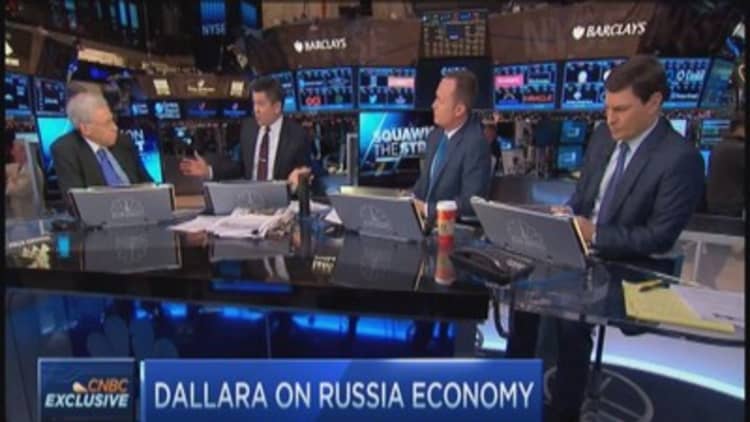
The Russian currency crisis could turn into a broader financial and economic crisis if its President Vladimir Putin doesn't signal a willingness to talk about its approach to Ukraine, Charles Dallara, the former managing director at the Institute of Finance, told CNBC on Wednesday.
That rout could also spill into other emerging markets and damage the United States' recovery, he added.
"A combination of the collapse of oil prices, the capital flight out of Russia and now another round of sanctions … have put the Russian economy on the brink," Dallara said in an interview with "Squawk on the Street."
"I think Putin will have to find a way to signal, even if it's a modest signal, an openness to dialogue."
Putin is expected to address the currency crisis in a speech Thursday.
On Wednesday, Russia continued to try to stem the devaluing of the ruble, with its central bank announcing it was preparing measures to pump money into banks in 2015. The ruble made a comeback on the news, after tumbling to record lows Tuesday.
Read More Ruble in massive rally as central bank steps in
On Monday night, the central bank raised interest rates to 17 percent, which caused the currency to plunge.
The country is also facing new sanctions from the U.S. over its activities in Ukraine, and President Barack Obama is on the matter by the end of the week.
Dallara, now chairman of the Americas for Partners Group, was deeply engaged in the 1998 Russian crisis and was the chief debt negotiator for the Greek crisis. He's concerned the crisis could affect countries outside the Russian border.
"The Russian rout has the potential to spill over into key emerging markets such as Brazil, even into Turkey," he warned.
It's something he thinks the Federal Reserve should also bear in mind. While the U.S. recovery has been pretty impressive, the nation can't go it alone in 2015, Dallara said.
"What we are talking about is a potentially dynamic and difficult set of developments in a broader set of emerging markets which is going to feed back on the U.S. recovery."
Read More Fed on track to raise rates this summer: Survey
He believes the Fed should keep rates lower for longer and not signal a rate rise just yet.
—Reuters contributed to this report.


